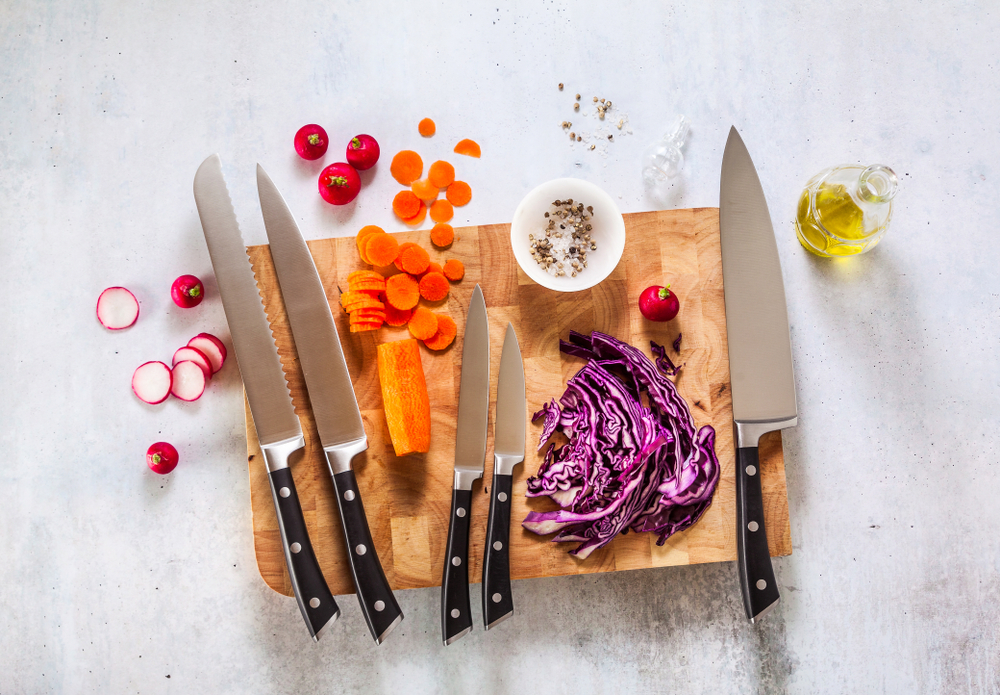Although sharp knives make cutting, chopping, and slicing a breeze for you, they come with a risk of injury as well. You can’t get away with this risk simply by avoiding sharpening your knives as blunt knives tend to slip and make you lose control, therefore, leading to cuts and bleeding. That’s when a self-sharpening knife block helps you to automatically sharpen the knife as you pull it out from the block to keep possible injury caused by dull knives at bay. However, we have jotted down some more useful safety tips for working with sharp knives for you to keep up the quality of work without compromising on your health.
Choose the Right Knife for the Task
You may get overwhelmed with a wide variety of knives such as different shapes, styles, and sizes, presented to you when stocking up on cutlery essentials. However, keep the following things in your mind to make the right decision:
- Blade edge – it can either make your task easier or harder. For example, Granton knives are ideal for wet foods while serrated knives are ideal for cutting through foods.
- Blade size – you need to ensure that the food you are about to cut matches the size of your knife’s blade. You can’t possibly use a butcher knife to chop green chilies or garlic.
- Flexibility – Some tasks require a flexible blade while others don’t. For instance, you can’t use a firm knife to remove scales from a salmon.
Store Your Knives Appropriately
Make sure that you never leave your sharp knives on the edge of countertops or even in a drawer. Give them a properly designated storage area like knife blocks or rolls to prevent injury and increase the durability of your knives. Also do not store the blades with the cutting edge exposed because if a person approaches them, they may unknowingly strike the knife which could lead to mishaps.
Wash Your Knives Properly
Many people overlook these safety tips when washing a knife. To ensure proper safety, you should appropriately wash your sharp knives because greasy knives may tend to make you lose your grip which can cause cuts. You should always check which knives can be washed in the dishwasher as some can’t, to protect their edges.
Never ever leave a sharp knife soaking in the sink of water. While doing the dishes, people may not know what dangerous utensils are placed there. To avoid this unpleasant situation, you should wash the knife right after it’s used and put it back in its designated area.
Always Pay Attention
While handling all of the kitchen tasks may distract you, but you need to pay full attention to your cutting task. If you’re distracted by something during your cutting task, you should stop cutting right there and sort out that matter, then you can carry on with your cutting task. Otherwise, you may cut your fingers which I’m pretty sure you wouldn’t want to happen. Doing this can help you perform best without compromising on your safety.
Know the Proper Cutting Techniques
If you are not trained enough to use different kinds of knives for different food items, you should get some basic classes of proper handling of knives to avoid any mishaps. Incorrectly holding your knife can also decrease your productivity and quality of work.
- Always use a stable cutting board. Go for a cutting board with rubber feet, or you can keep a damp cloth under it to prevent slipping.
- When chopping, curl your fingers and hold the food with your fingers curled in to prevent accidentally cutting your fingers.
- Never use the palm of your hand to cut food items as it directly puts you at risk of injury.
- Keep moving your hand away from the blade as you chop or cut through food with the other hand.

